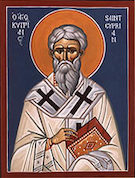 September 16, 2012
September 16, 2012 
Twenty-fourth Sunday in Ordinary Time
Saint of the day
Saint Cyprian (d.258)
Saint Cyprian was born in Tunisia around the year 200. He was a lawyer and professor of public speaking for most of his life, but at age 46 he became convinced that Christ told no lies, and joined the Christians. Only two years later, he was made bishop of Carthage in North Africa, and he made a rule not to make decisions without consulting his priests and the people in his diocese. However, Saint Cyprian became a bishop just as the Roman Empire swerved again toward bloody doings against Christians. In 258, Cyprian was beheaded in a field; interestingly, the direct accounts of that day, as filed in the report of the Roman proconsuls of the day, remark Cyprian's courtesy toward his executioner, and the executioner's courtesy to him (Taken from "Saints Passionate and Peculiar.")
Reflection
Saint Cyprian's conversion story underscores the colossal importance of honesty. Not only is honesty a virtue in and of itself, but honesty alone, when witnessed, has the power to transform others. When we could lie in order to avoid difficulties, but we tell the truth instead and face the attendant struggles, we set a truly holy example. Think of times when, rather than lie, you told the truth. Think of times you lied, and ask God to forgive these blunders.
Prayer
Dear Jesus, help me to be an honest person, as you were. Help my honesty inspire similar virtue in others.
Liturgical season information
Lectionary: 131
Place in Year: Ordinary Time
Color of decorations and priest's vestments: Green
Daily readings
Reading 1: Isaiah 50:5-9a
Responsorial Psalm: Psalm 114:1-2, 3-4, 5-6, 8-9
Reading 2: James 2:14-18
Gospel: Mark 8:27-35
View complete readings on USCCB.orgMeditations
Meditation for Gospel
Some parts of Christianity can seem completely opposed to common sense. In today's Gospel, Jesus tells us that whoever wants to live, must die. Our initial reaction to this statement may be one of surprise or confusion, but God asks us to use our hearts, not just our reason, when we live our faith. When we faithfully consider the Gospel charge to take up our crosses, we can come to a deeper understanding of the Christian life. Jesus promises joy, love, and happiness eternally - but we won't experience those things until Heaven. To die during this life means to die to our sins, die to our passions, die to our attachment to material possessions - all in order to prepare ourselves to LIVE - in Heaven with God, eternally. Seen through the eyes of faith, it is easier to understand why Jesus tell us that in order to live, we must first die.



